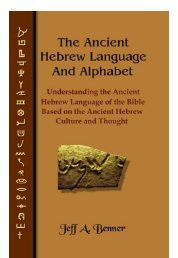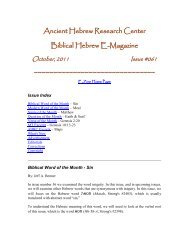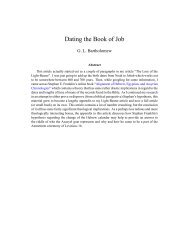My Name Forever - Ancient Hebrew Research Center
My Name Forever - Ancient Hebrew Research Center
My Name Forever - Ancient Hebrew Research Center
You also want an ePaper? Increase the reach of your titles
YUMPU automatically turns print PDFs into web optimized ePapers that Google loves.
<strong>My</strong> <strong>Name</strong> <strong>Forever</strong> 13<br />
Rather, it is changed from a Hei v to an Aleph t. What do we get when we change the “Syriac” style<br />
Aleph t back to its original Hei v? We get Y’hú(v) vU vh. Is there any difference in speech between<br />
y’hú(t) tU vh with an Aleph t and Y’hú(v) vU vh with a Hei v? No. Neither the Hei v nor the Aleph t<br />
affect the pronunciation. They are both, for all intents and purposes, silent. And what do we get when we<br />
return the lacking Hei v to the <strong>Name</strong> as it sometimes appears at the end of Michaiah’s name? We get<br />
Y’hu(v) vUvh. And when we supply the accent it would have in normal speech we have Y’hú(v) vU vh. Is<br />
there any difference in meaning between Y’hú(v) vU vh with a Hei v and y’hú(t) tU vh with an Aleph t?<br />
Grammatically, no. Both express, “He will be.” But contextually there is a tremendous difference, for<br />
y’hú(t) tU vh means generically, “he will be,” while Y’hú(v) vU vh is the <strong>Name</strong> and quite specifically<br />
communicates, “He Will Be.” Perhaps that is precisely the reason why Y’hú U vh in Ecc. 11:3 was written<br />
with an Aleph t and not a Hei v. A change of the final letter from a Hei v to an Aleph t would be all that<br />
was necessary to distinguish the ordinary, everyday, purely grammatical, "he will be," from the One<br />
whose name means, "He Will Be," would it not?<br />
Yahweh vu vh<br />
40. By far, the most common pronunciation of the <strong>Name</strong> is Yahweh vu vh. One popular line of<br />
reasoning in support of this pronunciation has to do with a statement made by Josephus. According to<br />
him, the Tetragram consisted of “four vowels.” Speaking of the high priest’s garments, he says the<br />
following:<br />
A mitre also of fine linen encompassed his head, which was tied by a blue ribbon, about<br />
which there was another golden crown, in which was engraven the sacred name: it<br />
consists of four vowels. 42<br />
41. After reading this some have mistakenly concluded that since Josephus calls the letters of the<br />
Tetragram, “Four vowels,” they were pronounced as such: The Yud h is pronounced “ee,” the first Hei v is<br />
pronounced “ah,” the Vav u is pronounced “oo,” and the final Hei v is pronounced, “ay.” Put them all<br />
together and you have, “ee-ah-oo-ay,” hence - Yahweh. 43 The Scriptural evidence presented here,<br />
however, does not lead us to this pronunciation. Nor does the structure and character of the <strong>Hebrew</strong><br />
language itself. In order to properly understand what Josephus meant by, “Four vowels,” we must know<br />
something about that language, as he originally wrote The Jewish War in <strong>Hebrew</strong>. He then translated it<br />
into Greek. Here it is in his own words:<br />
I have proposed to myself, for the sake of such as live under the government of the<br />
Romans, to translate those books into the Greek tongue, which I formerly composed in<br />
the language of our country... 44<br />
42 Flavius Josephus: The Jewish War 5:5:7 [5:235]( Translated by William Whiston)<br />
43 The Sacred <strong>Name</strong> (Qadesh La Yahweh Press, 2002), pp. 103-104.<br />
44 Josephus: The Jewish War 1:1 (Translated by William Whiston)






